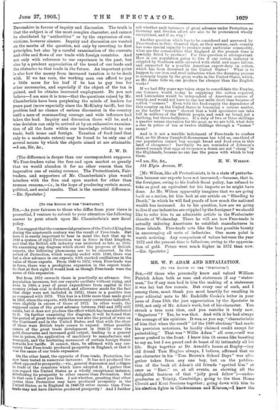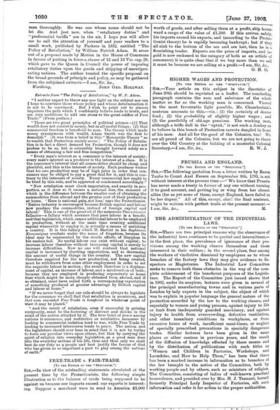MR. W. P. ADAM AND RETALIATION. [To TIM EDITOR OF
Till "SascrAroa..1 SIR,—Of those who personally knew and valued William Patrick Adam both as man and statesman (I say " states- man," for if any man had in him the making of a statesman it was he) but few remain. But every one of such, and I among them, must thank you most heartily for recalling in your editorial note to Mr. Radcliffe Cooke's letter in your issue of June 13th the just appreciation by the Spectator in 1881, not only of Mr. Adam's work, but of his character. You struck a true note then, and you restrike it truly now. " Sagacious " ? Yes, he was that. And with it he had always the courage of his opinions. It was, as you say, " characteristic of him that when the result" (of the 1880 election)" had made his prevision notorious, he hardly claimed credit except for painstaking." That was " Willie Adam " all over,—self was never pushed to the front. I knew him (it seems like boasting to say so, but I am proud and do boast of it) intimately all his life. Boys together at Dr. Arnold's house at Rugby—(my old friend Tom Hughes always, I believe, affirmed that no one character in his " Tom Brown's School Days" was alto- gether taken from any one boy, but on the publica- tion of the book all Adam's old friends " spotted him" at once as " East," or, at all events, as showing all the delightful features of that "jolly good fellow ")—under- graduates at Trinity, Cambridge; going to the then Home Circuit and Kent Sessions together ; going down with him to his election fights in Clackmannan and Kinross,—I knew the
man thoroughly. He was one whose name should not be let die. And just now, when " retaliatory duties " and " preferential tariffs " are in the air, I hope you will allow me to call the attention of yourself and your readers to a small work, published by Parkers in 1852, entitled " The Policy of Retaliation," by William Patrick Adam. It arose out of a proposal made by Motion in the House of Commons in favour of putting in force a clause of 12 and 13 Vic. cap. 29, which gave to the Queen in Council the power of imposing retaliatory duties upon the goods and shipping of unrecipro. eating nations. The author treated the specific proposal on the broad grounds of principle and policy, as may be gathered from the subjoined extracts.—I am, Sir, &c.,
Retracts from "The Policy of Retaliation," by W. P. Adam.
"I neither expect to throw any new light on the subject nor can I hope to convince those whose policy and whose determination it is not to be convinced. But I wish to point out to sincere inquirers the path which I confidently believe leads to truth, and am very ambitious to add one stone to the great edifice of Free Trade." (From preface.)
"There are two great principles of political science—(l) That wealth does not consist in money, but in all useful things ; (2) that commercial freedom is beneficial to man. The theory which made money synonymous with wealth Adam Smith was the first to demolish." [It was from a belief in this " Mercantile Theory " as to wealth that Protection mainly arose.] " The Policy of Retalia- tion is in fact a direct demand for Protection, though it does not profess to be so, but is ostensibly brought forward solely as a means of obtaining a fair and free competition."
" Every man's interest as a consumer is the interest of society; every man's interest as a producer is the interest of a class. It is the consumer's interest that all commodities should be cheap and plentiful, and this is the interest of society. Each producer wishes that his own production may be of high price in order that con- sumers may be obliged to pay a great deal for it, and this is con- trary to the interests of society. Every commercial law ought to be tried by this rule, and be approved or condemned accordingly."
" Now retaliation must check importation, and exactly in pro- portion as it does so it causes a national loss, the measure of which is the difference between the smaller cost of obtaining the commodities from abroad and the greater cost of their production at home. Here is national gain, not loss,' says the Protectionist. 'Native industry is encouraged because British capital and labour now produce the commodities, instead of foreign capital and labour.' This is one of the greatest of the numerous Protectionist fallacies—a fallacy which assumes that pure labour is a benefit, and that legislation, which causes-additional labour to be employed in production, without at the same time creating additional capital wherewith to employ it, is actually a means of enriching a country. It is this fallacy which M. Bastiat in his Sophismes Reonomiques combats under the name of Sisyphism, because its ideal may be represented by the sterile efforts of Sisyphus in his useless toil. No useful labour can exist without capital; to increase labour therefore without increasing capital is merely to increase difficulties. Now no one will contend that national capital is increased by checking importation, and so decreasing the amount of useful things in the country. The new capital therefore required for the new production, not being created, must be withdrawn from some other employment in order to set the requisite labour in motion ; the result therefore is a displace- ment of capital, an increase of labour, and a misdirection of both ; because they are employed in producing expensively at home that which might be more cheaply obtained from abroad, and if so obtained, must have called forth a corresponding exportation of something produced at greater advantage by British capital and labour at home."
"If we never forget that our rule should be always to legislate for the consumer we shall find that retaliation is pernicious, and that even one-sided Free Trade is beneficial in whatever point of view it may be placed."
"And the result of retaliation, even if successful in gaining reciprocity, must be the fostering of distrust and dislike in the mind of the nation attacked by it. The true bond of peace among nations is commerce, and restrictive or retaliative measures by leading to commercial isolation tend to war, while Free Trade by leading to increased intercourse tends to peace. The nation and the legislature should ever bear in mind that it is not by trying to force our peculiar views upon others, but that by carrying the spirit of religion into everyday legislation, as a good man does into the everyday actions of his life, thus and thus only we shall best do our duty as a people and best justify the favour of God who has given us so important a part to play among the nations of earth."























































 Previous page
Previous page